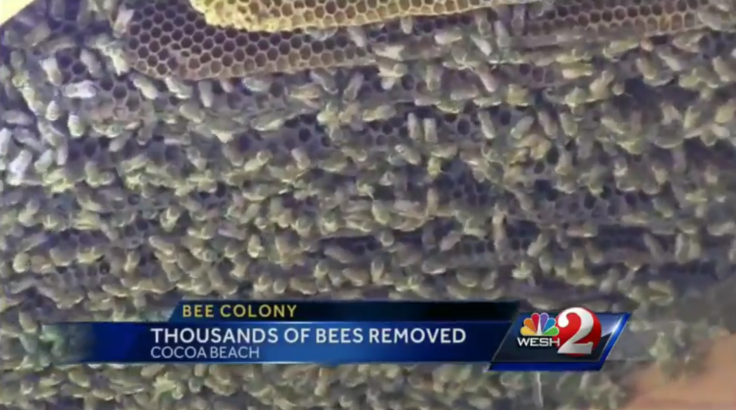20,000 Bees Removed From Sevia Moore’s Home, Elderly Florida Woman ‘Didn’t Even See Any’ Honeybees [PHOTOS]

Sevia Moore said she never heard the bees buzzing inside her Florida home.
The 98-year-old woman had anywhere between 20,000 and 30,000 bees removed from her Cocoa Beach home on Saturday after Moore’s granddaughter heard buzzing coming from the attic, NBC News reports.
"They didn't bother me. When I was outside, I didn't even see any," Moore said.
Leo Cross, the founder of Florida Wildlife Trappers, and a colleague used a vacuum to suck up the bees into a holding container. The honey may have attracted some unwanted rodents too, Cross said, adding that he saw rats eating wax cells in the attic.
"She'd had this colony of bees up there for about a year," Cross said, adding, "It's pretty mind-boggling not to notice that you have a beehive of that size upstairs."

Rather than kill the bees, the swarm has been sent to a safe location, Cross said. "The honeybee population is hurting right now. It's important to save the hive [so] they can go on to reproduce. They are good for the environment," he told WESH.
This isn’t the first time thousands of bees have been found hidden in a home. In May, Tyler and Haley Judd from Provo, Utah, had between 70,000 to 80,000 bees removed from their house after the swarm was found living inside the bedroom wall, ABC News reports.
“I know it happens to other people, but I didn’t think it was that big,” Tyler Judd said about the beehive. "It was kind of unbelievable and kind of crazy that there were so many bees right behind our bed.”
Honeybees are facing a population crisis in the United States. Known as “colony collapse disorder,” the phenomenon describes the mass disappearance of the bee population across the United States, where nearly one-third of all honeybee colonies have vanished, according to the National Resources Defense Council. While the precise cause remains unknown, a combination of pesticide exposure, parasites and inadequate food supply may be to blame.
“We have reached a disaster point, from a beekeeping industry standpoint,” Steve Ellis, a beekeeper from Barrett, Minn., told Al-Jazeera America, pointing to the fact that bees account for more than $15 billion in agricultural revenue. “It just needs to be understood by the people of the country that we have a Deepwater Horizon occurring with pollinators and we need to deal with it.”
© Copyright IBTimes 2024. All rights reserved.






















